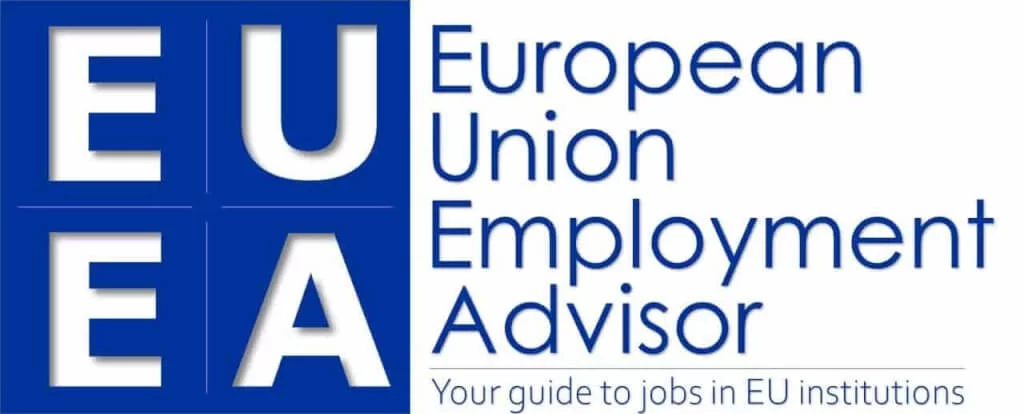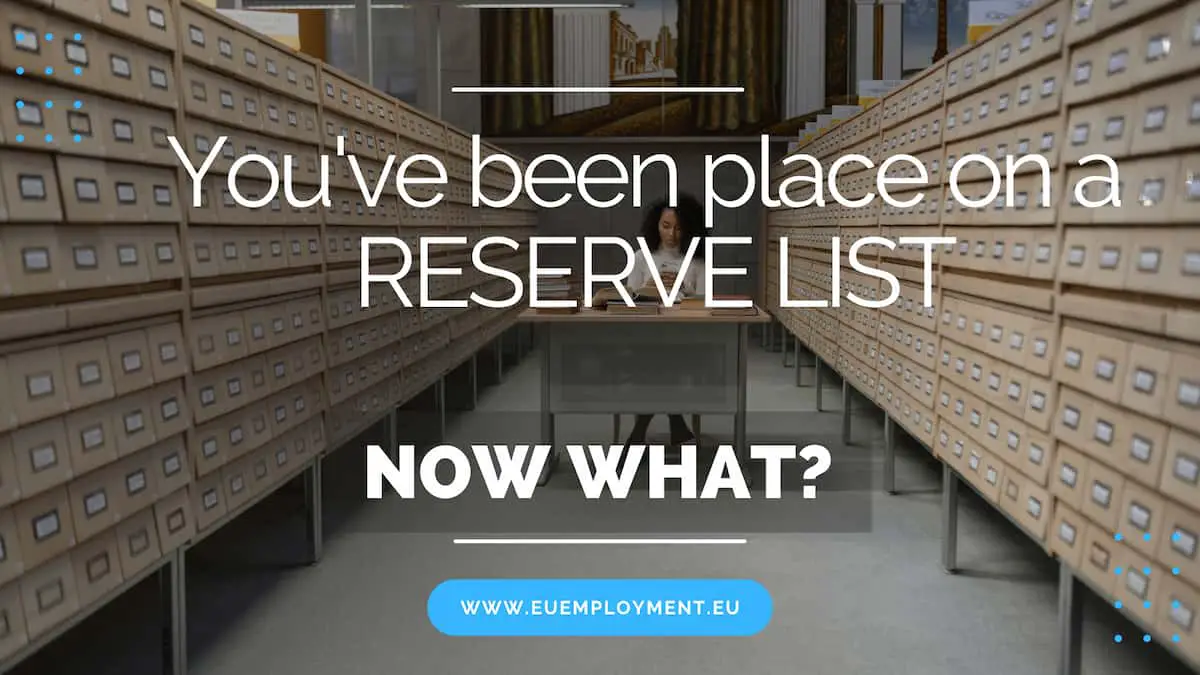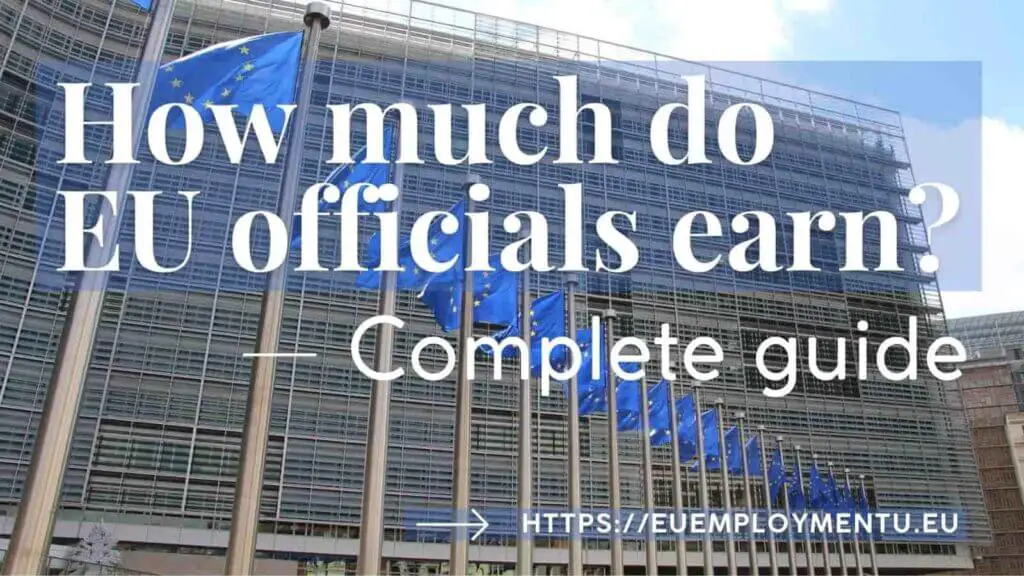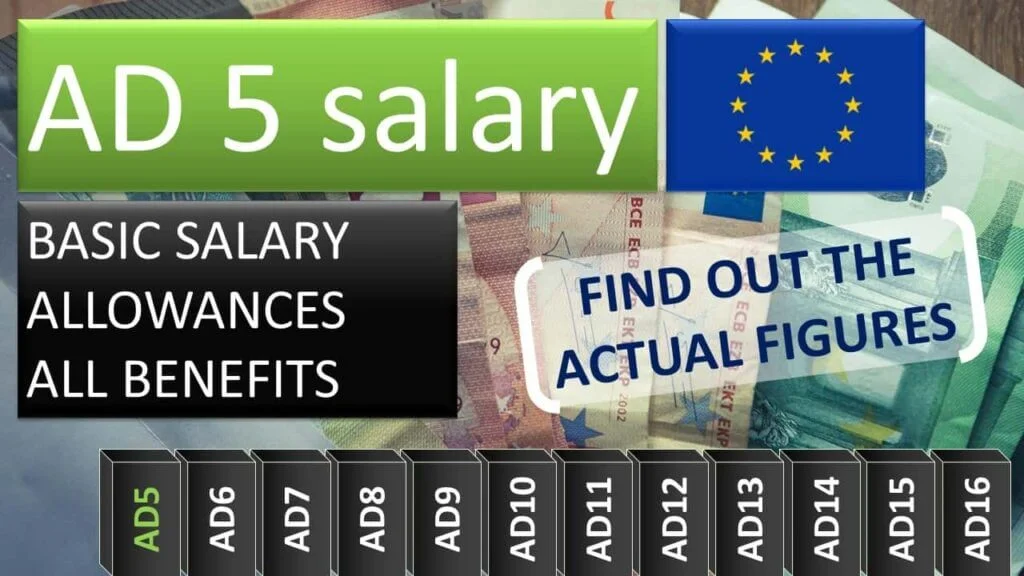If you have succesfully taken part in an EPSO competition or a selection process run directly by an EU agency, you might get a notification that reads something like this:
In relation to your application for the position of [JOB TITLE at INSTITUTION NAME], we are please to inform you that you have been placed on the reserve list for this profile.
This article will explain what does this mean, why it’s a good thing, and why you should try to get on as many reserve lists as possible.
What are ‘reserve lists’ in EU institutions?
‘Reserve lists’ are pools of applicants that have sucessfully gone through the selection process of EPSO or an EU agency and are now “shortlisted” as potential employees. When the EU institution that organized the selection process has an actual vacancy to fill, a job offer will be sent to the most appropriate person on the reserve list.
The person has a month to accept the job offer. If the person declines the job offer, it is sent to the second most appropriate person on the reserver list, and so on until either the vacancy is filled, or there are no more persons on the reserve list.
If there are no more persons on the reserve list or the list expires, to attract staff for a particular type of jobs the agency must organize a new selection process and create a new reserve list.
Are reserve lists used by all EU institutions?
Yes, all EU institutions use reserve lists.
The European Commission, the European Parliament, the Council, the Court of Auditors, the Committee of the Regions, the European Economic and Social Committee and a few other EU institutions hire exclusively through the European Personnel Selection Office (EPSO) reserve lists.
The 40+ EU agencies usually create reserve lists and hire staff throug their own selection procedues. However, EU agencies can also use EPSO reserve lists.
Positive aspects of placement on a reserve list
- If you are on a reserve list, you do not have to participate in further competitions for the same type of vacancy. You might be considered for a position until the list is valid and new (possibly, better qualified) candidates cannot enter the particular list.
- If you are good at networking AND are on a reserve list of a particular EU institution, that significantly increases your chances of being hired.
- Institutions tend to prolong validity of lists until the maximum limit (usually 4 years) to decrease administrative burden for their HR departments. This prolongs your elgibility and chances to get a job at an institution you like.
Negative aspects of placement on a reserve list
- Being placed on a reserve list does not guarantee employment in an EU institution.
- It is impossible to tell when you might get an offer, and the list validity can expire without you getting an offer.
- Job offers are usually sent to the person thats viewed as most appropriate for a particular vacancy. Overqualified candidates (you?) can be passed by other persons on the list.
Strategic job applications to land on a reserve list
If you have an EU institution that you would like to work for (did you know there are 40+ EU agencies covering just as many fields of economy and society?!), it’s impotant to apply to its vacancies immediatelly. Even if you are not interested to change your job right now. Why?
Because of the ‘reserve lists’ system. Reserve lists are by default valid for 2 years and can be extended for up to 4 years. This means that at the moment when YOU decide you are ready to work for an EU agency, the agency might not have any vacancy announcements for another 2-4 years.
If you decide to go through EPSO to get a job at the European Commission, the European Parliament, the Council and a few other “main” EU institutions, the process takes at least 9 months and most succesful candidates do not get offered a job right away. Also – most people pass EPSO exams only after several tries, so it’s good to practice. This is another reason why it’s important to get on a resrve list as soon as possible.
For how long are reserve lists valid?
Reserve lists of EPSO and EU agencies are usually valid for two years, and can be extended for up to four years in total.
Extension of a reserve list largely depends on the quality of candidates remaining on the list, and such internal considerations as if an EU institution will need a large number of the particular professional profile in the near future. If there are a few candidates remaining on a list and/or a large hiring drive is planned, the institution will choose to run a new selection process.
Will I be removed from a reserve list if I do not accept an offer?
No, you are not removed from a reserve list if you do not accept a particular job offer. You might get another job offer as long as the list remains valid.
Can I find out who else is on a reserve list?
No. This is confidential information. Leaking this information would be a serious breach of EU data protection rules.
Can I apply for other jobs at the same institution if I’m already on a reserve list?
Yes. And – you definitively should. To maximize your chances of being hired in the foreseeable future, you should apply to as many selection processes throught EPSO or directly with the desired institution as possible.
What happens after I get a job offer?
If you get a job offer after you placement on a reserve list AND you accept it within a month, the process is quite straight forward. You are then required to undergo a medical examination.

Read more about the ‘medical examination‘
If you succesfully pass the medical examination, you are hired for a job in the same contract type and grade that was advertised in the vacancy announcement: administrator, assistant, contract agent.
Do you have question or suggestion for this article? Please share in a comment below and let’s make this resource better for you and other readers!







16 responses to “Reserve lists: an explainer”
Hello Ben,
I am on a reserve list and would like to contact a selection board member. I think that the restriction to contact them does not apply after the EPSO competition is over and the reserve list is published, since they are no longer board members. What do you think?
Thank you in advance and kind regards.
Do you know by any chance if the reserve lists created by the EIT are open to other EU agencies? Thanks
When you on a reserved list and it take you a month for hired, it possible to do follow up?
Thank you so much for all your work. I wish I came across your work much earlier, this is so useful. About reserved lists, you write ‘No, you are not removed from a reserve list if you do not accept a particular job offer. You might get another job offer as long as the list remains valid.’ I had always heard the opposite based on the experience of different colleagues. They were offered a job based on their place on a reserve list, they declined the job offer and were removed as a result. I can’t say if they were removed officially or unofficially. Also, what happens if you are the preferred candidate (they offer you the job to start right away in opposition to placing you on the reserve list) and you decline the offer? Will they will agree to place you on the reserve list? Did someone face this situation? I think they won’t. This makes applying to jobs for the future tricky because you want to end up on the reserve list but not be offered the job so you have to be their second favorite.
Do you know if Agencies can exchange their reserve lists? Can you receive an offer from an Agency different to the one where you applied?
Thank you!
Hello,
I had heard from a friend from a small agency that were facing staff issues at the time in their HR team that this agency had used reserve lists from other agencies for certain admin roles.
Hi Ben,
Interesting article, do you know if the Appointing Authority is bound to appoint people from the reserve list for any new position very similar to the position for which the candidates were put in the reserve list? Has the Authority to provide jutification in case of disregarding the reserve list?
There is some discretion for EU institutions in cases like yours. The do not have to provide justification, and outsiders can’t really find out what’s goes on inside the “black box”. It’s up to the institution’s HR to decide which reserve lists apply to which posts. However, in general, EU institutions try to “exhaust” all reserve lists before announcing new competitions these days due to the large workload associated with organizing recruitment. If you are on a reserver list, there’s a high likelihood you will get an offer, unless you are applying to a very small EU agency (under 200 people) where staff turnover is very low.
Hi Ben,
You write: “If you are good at networking AND are on a reserve list of a particular EU institution, that significantly increases your chances of being hired.”
As someone applying from the private sector and not employed in another capacity by an institution, how should I interpret this? That in practive, it’s a significant advantage (if not a de facto requirement) to already by employed as a contractual agent?
Thanks!
What I meant is not linked to Contract Agent status. The main points is that if you are placed on a reserve list, if possible, don’t just patiently wait for a job offer, but try to find out if you can network and make a good impression of staff of the institution you want to work for. This might facilitate getting an offer sooner rather than later.
Hi Ben
So, does it mean that I should LinkedIn my interviewers and ask for connection?
Definitively, do not contact the Selection Committee members. But if you are able to network with agency staff, that might help. A typical example is if you are civil servant for a national administration, and are already cooperating with the agency. In this case you can indicate your counterparts that you are interested in joining and are already on a reserve list.
Another venue is to get on a reserve list. Apply as an interim. Show yourself in the first few month, and then you might be “plucked” from the reserve list.
Be creative about this.
Hello Ben,
Very interesting article. I have a question related to reserve lists. I know that being on one agency’s reserve list does not guarantee employment, but what is typically, referring to your experience, the probability of receiving a job offer when being put on one? And also what is the average time for a reserve list to be completed.
Regards,
Marco
Hi, Marco!
This is just from my experience, so please don’t treat the reply below as any kind of official stats. It’s more like “anecdata” 🙂 With that out the way, here’s my reply.
Reserve lists are usually valid for 2 years, and often get extended for another 2 years if there are sufficient candidates there. If the list is empty or the candidates are judged to be subpar, agencies usually run new competitions.
The larger the agency, the shorter the period for each list’s validity as larger agency require more staff and “consumes” the list more quickly.
Again – the larger the agency, the sooner you can expect an offer. The smaller the agency, the longer in can take. If you have good qualifications, you should get an offer agency within a period of a few months to 1,5 years. Smaller agencies are more likely to have valid reserve lists for full 4 years. I have myself received an offer after 2 years from a small agency, and know of a case where an offer was made after 3 years.
Tip –
Even if you are applying for agencies, it’s worth to be on a relevant CAST list (contract agents). Agencies relatively often “fish” for candidates also from these EPSO lists.
Hello Ben,
After you’re put on the reserve list and lets say they get back to you after a while, you do not receive directly the job offer right? You still need to have some more interviews? Even if it’s for the same job you applied and interviewed for initially?
Thank you!
Hello Ben,
eventually (after 2 years from my placement in the reserve list) I have been contacted by the HR representative of the agency I applied for. They contacted me for a different position wrt the one I applied for, therefore I will need to have a discussion with the hiring manager of the new position.
Is this still a part of the selection process? Or was I selected from the reserve list and this is only an additional formality?
I tried to ask the HR person about this and she told me that I have not been offered the position yet.
Thanks a lot for your help